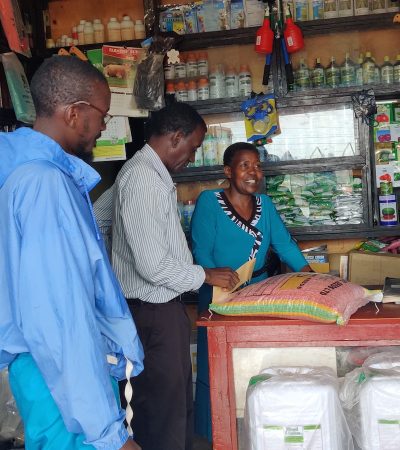The women of Kamushoko Cooperative in Uganda know that self-reliance isn’t always a matter of going it alone. They attribute their recent economic and production successes to their strength in numbers.
At one time—before they were members of the Kamushoko Cooperative—the women farmed, harvested and sold their produce, such as millet and plantains, individually. On their own, they lacked bargaining power and faced limited marketing outlets. They also had inadequate storage facilities for their crops, and that meant they had to sell their harvested produce immediately—at peak season, when prices were low and profits were meager.
Thanks to a grant from the U.S. African Development Foundation (USADF), a Feed the Future partner, these women are now banding together, bargaining collectively and turning their cooperative into a profit-making agribusiness that is boosting sales, family income and food security in their community.
Joan Mukongo has led the cooperative since 2013, when it was first funded with a Feed the Future grant to improve management and financial systems. Joan convinced the women farmers to store their crops, sell in bulk at low season and shop around for buyers. This paid off: the farmers began to speak with one voice and to sell their products together, increasing their sales revenue by over 60 percent in the very first year. By 2015, when the first grant ended, Kamushoko Cooperative had doubled its sales revenue from millet and plantains and increased its membership from 67 to nearly 100 members, almost all of which were women.
By working and bargaining together, members of the cooperative are achieving successes that would have been hard, if not impossible, to achieve on their own. They are expanding their market beyond the regular vendor in town. They are now able to invest their profits in a facility to store their grain, which allows them to sell at a time of optimal profitability. By reinvesting the profits back into the cooperative, the women are setting good examples and becoming community leaders and powerful agents for change.
By collaborating with a local USADF partner to improve their agricultural techniques and the Kamushoko Cooperative’s organizational capacity, the members have pushed themselves to dream big. Today, the cooperative’s members are financially independent―they are earning regular salaries, opening their first bank accounts, and sending their children to school. “We are an example in the community that agriculture can be a business,” Mukongo said.
But their big dreams don’t stop there. With a second grant through USADF, the women are moving ahead to expand their enterprise, purchase processing equipment, and build a commercial trading center. They hope this is just the start of a long, successful agricultural enterprise.




